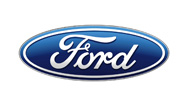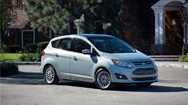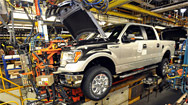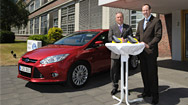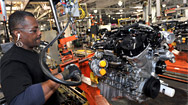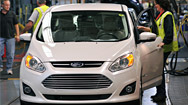Performance Summary
Below is a summary of our key performance data. Please also see the Year in Review for discussion of data parameters, as well as the data sections in the Financial Health Data, Climate Change and the Environment Data, Supply Chain Data, Water Data, Vehicle Safety and Driver Assist Technologies Data, and People Data sections for additional indicators, five-year trends and notes on data assurance.
On this page
Financial Health
| 2010 | 2011 | 2012 | |
|---|---|---|---|
| Global Quality Research System “things gone wrong” (3 months in service), total “things gone wrong” per 1,000 vehicles1 | 1,140 | 1,447 | 1,373 |
| Global Quality Research System customer satisfaction (3 months in service), percent satisfied2 | 82 | 68 | 72 |
| Sales satisfaction with dealer/retailer, Ford brand, U.S., net promoter score | 84.0 | 85.0 | 87.0 |
| Sales satisfaction with dealer/retailer, Ford brand, Europe, net promoter score | 79.0 | 82.0 | 86.5 |
| Service satisfaction with dealer/retailer, Ford brand, U.S., net promoter score | 75.0 | 75.0 | 78.0 |
| Service satisfaction with dealer/retailer, Ford brand, Europe, net promoter score | 59.0 | 64.0 | 71.5 |
| Shareholder return – Bloomberg total return analysis, percent | 67.9 | -36 | 23 |
| Net income/loss, $ billion | 6.6 | 20.2 | 5.7 |
| Sales and revenue, $ billion | 129 | 136 | 134.3 |
Climate Change and the Environment
| 2010 | 2011 | 2012 | |
|---|---|---|---|
| Ford U.S. fleet fuel economy, combined car and truck, miles per gallon (higher mpg reflects improvement) | 26.9 | 27.8 | 30.0 |
| Ford U.S. fleet CO2 emissions, combined car and truck, grams per mile (lower grams per mile reflects improvement) | 329 | 318 | 297 |
| Ford Europe CO2 tailpipe emissions per vehicle, grams per kilometer (based on production data for European markets) | 128 | 130 | 1293 |
| Worldwide facility energy consumption, billion kilowatt hours | 16.1 | 15.5 | 14.0 |
| Worldwide facility energy consumption per vehicle, kilowatt hours per vehicle | 3,087 | 2,778 | 2,449 |
| Worldwide facility CO2 emissions, million metric tons | 5.2 | 5.1 | 5.1 |
| Worldwide facility CO2 emissions per vehicle, metric tons | 1.01 | 0.91 | 0.90 |
| North American Energy Efficiency Index, percent (higher percentage reflects improvement) | 14.4 | 2.6 | 6.44 |
Water
| 2010 | 2011 | 2012 | |
|---|---|---|---|
| Global water use, million cubic meters | 26.2 | 25.7 | 23.9 |
| Global water use per vehicle produced, cubic meters | 5.1 | 4.7 | 4.3 |
Vehicle Safety and Driver Assist Technologies
| 2010 | 2011 | 2012 | |
|---|---|---|---|
| U.S. safety recalls, number per calendar year (including legacy vehicles on the road for 10+ years) | 7 | 13 | 24 |
| U.S. units recalled, number of units (including legacy vechicles on the road for 10+ years) | 551,000 | 3,339,000 | 1,399,000 |
| IIHS Top Safety Picks by model year, percent of Ford Motor Company vehicles tested receiving the honor | n/a | 52 | 755 |
Supply Chain
| 2010 | 2011 | 2012 | |
|---|---|---|---|
| Number of individuals trained in working conditions requirements and sustainability management systems | 2,149 | 2,414 | 2,760 |
| Assessments to date6 | 751 | 834 | 811 |
| Training cascade to workforce, individuals trained | 318,593 | 372,998 | 430,257 |
People
| 2010 | 2011 | 2012 | |
|---|---|---|---|
| Employee satisfaction, Pulse survey, overall, percent satisfied | 68 | 69 | 71 |
| Overall dealer attitude, Ford, relative ranking on a scale of 1–100 percent (winter/summer score) | 83/85 | 84/82 | 84/83 |
| Overall dealer attitude, Lincoln Mercury, relative ranking on a scale of 1–100 percent (winter/summer score) | 71/62 | 61/64 | 68/67 |
| Ford Motor Company Fund contributions, $ million | 19 | 20 | 21.6 |
| Corporate contributions, $ million | 10 | 10 | 8.5 |
| Volunteer Corps, thousand volunteer hours | 112 | 110 | 115 |
| Lost-time case rate (per 100 employees) | |||
| Americas | 0.8 | 0.9 | 0.8 |
| Asia Pacific and Africa | 0.1 | 0.1 | 0.1 |
| Europe | 0.3 | 0.3 | 0.4 |
- The Global Quality Research System (GQRS) is a Ford-sponsored competitive research survey. The GQRS is a good indicator of other quality results. For the 2011 model year, we began reporting global GQRS TGW data. In previous years we had reported only North American region GQRS TGW data. In addition, we changed the GQRS survey to include additional questions on vehicle entertainment and information systems. Therefore, the 2011 results are not comparable to previous years.
- The Global Quality Research System (GQRS) is a Ford-sponsored competitive research survey. The GQRS is a good indicator of other quality results. For the 2011 model year, we began reporting global GQRS Customer Satisfaction data. In previous years, we had reported only North American region GQRS Customer Satisfaction data. In addition, we changed the GQRS survey to include additional questions on vehicle entertainment and information systems. Therefore, 2011 results are not comparable to previous years.
- This is preliminary data; official data from European Commission expected in November 2013.
- The energy efficiency index is a normalized indicator of energy used per vehicle produced based on a calculation that adjusts for typical variances in weather and vehicle production. The Index is set at 100 for the baseline year to simplify tracking annual improvements. In 2012, we expanded our energy efficiency to include global energy use data. In previous years, it only included energy use at North American facilities. In 2012, we also reset the baseline year to 2011. A year 2000 baseline was used through 2006; the baseline was reset to year 2010 starting in 2011. The year 2012 improvement indexed against the year 2011 baseline was 6.4, indicating a 6.4 percent improvement in global energy efficiency per vehicle from 2011 to 2012. Higher percentage reflects improvement.
- In 2013, this figure rose to 93 percent.
- Prior-year ‘Assessments completed to date’ figures reflect calculation errors in deriving totals. These errors have been corrected for 2012; however, certain figures may be slightly lower than in prior years due to the calculation corrections.



